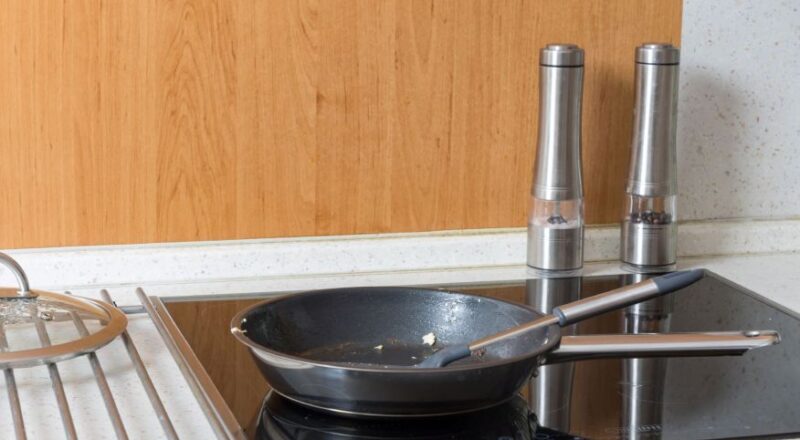Protecting your glass cooktop from potential damage caused by cast iron cookware is crucial for maintaining its appearance and functionality. Cast iron is a favored choice for many due to its excellent heat retention and even cooking surface, but it can also be heavy and abrasive, potentially leading to scratches and cracks if not handled properly. In this guide, we’ll explore effective methods to ensure your glass cooktop remains in pristine condition while enjoying the benefits of cast iron cooking.

Understanding the Challenges of Using Cast Iron on Glass Cooktops
**Glass cooktops** are popular for their sleek design and ease of cleaning. However, they are susceptible to scratches and damage from heavy cookware like **cast iron**. The weight and rough texture of cast iron pots and pans can cause unwanted marks on the smooth surface of your cooktop. To avoid costly repairs or replacements, it’s essential to implement protective strategies.
Why Cast Iron is Popular
Despite the potential risks, cast iron remains a staple in many kitchens due to its durability and superior heat conduction. Its perfect for searing meats, baking, and even frying. Understanding how to use it safely with your glass cooktop can help you enjoy its benefits without compromising your appliance.
Potential Risks to Glass Cooktops
The primary risks associated with using cast iron on glass cooktops include scratches, stains, and in severe cases, cracks. These can occur because of the cookware’s weight, rough base, or abrupt temperature changes. Implementing preventive measures can drastically reduce these risks.
Protective Measures to Consider
Use Cookware Pads
One of the simplest ways to protect your glass cooktop is by using **cookware pads** or mats specifically designed for this purpose. These silicone or fabric pads act as a cushion between the cast iron and the glass surface, preventing scratches and absorbing impact.
Lift, Don’t Slide
When moving cast iron cookware on your cooktop, always lift it rather than sliding. Sliding can cause scratches due to the rough texture of cast iron. Ensure you have a firm grip to prevent any accidental drops.
Keep the Cooktop Clean
Regularly cleaning your cooktop helps prevent residue buildup that can contribute to scratches. Use a gentle cleaner and a soft cloth to maintain its shine. Avoid abrasive materials that can further damage the surface.
Condition Your Cookware
Properly **seasoning cast iron cookware** can create a smoother surface, reducing the likelihood of scratches. A well-maintained cast iron pan not only enhances cooking but also minimizes damage risk to your glass cooktop. For tips on seasoning, check out this guide.
Choosing the Right Cast Iron Cookware
Flat-Bottomed Cookware
Opt for cast iron cookware with a flat bottom. This ensures even contact with the cooktop, reducing the risk of scratches and uneven cooking. A flat base is less likely to cause movement that can lead to damage.
Size Matters
Ensure your cookware is the appropriate size for your cooktops burners. Oversized pots can cause heat to concentrate in certain areas, potentially leading to cracks. Under-sized pots may not distribute heat evenly, compromising cooking quality.
Invest in Quality
High-quality cast iron cookware is often smoother and less likely to cause damage. Investing in reputable brands can provide you with better performance and longevity.
Additional Tips for Glass Cooktop Care
Regular Inspection
Routinely check your cooktop for any signs of wear or damage. Early detection of problems can prevent further damage and costly repairs.
Mind the Heat
Avoid sudden temperature changes on your cooktop. Allow it to cool before placing cold cookware on it, and vice versa. This helps prevent thermal shock, which can lead to cracks.
Use Appropriate Cleaning Products
Choose non-abrasive cleaning products designed for glass cooktops. These cleaners effectively remove grime without harming the delicate surface.
Conclusion
By understanding how to protect your glass cooktop from cast iron, you can enjoy the culinary benefits of both without compromise. By taking simple precautions, such as using cookware pads, lifting instead of sliding, and selecting the right cookware, you can maintain a pristine cooktop. Regular care and inspection further ensure your cooktop remains a valuable kitchen asset for years to come.

FAQ
Can cast iron damage a glass cooktop?
Yes, if not used carefully, **cast iron** can scratch or crack a **glass cooktop**. It’s important to use protective measures to prevent damage.
What are the best pads for protecting glass cooktops?
Silicone or fabric pads specifically designed for cooktops are recommended. They provide a cushion that prevents scratches.
Is seasoning cast iron necessary for protecting glass cooktops?
**Seasoning** helps create a smoother surface on the cookware, reducing the risk of scratches. It’s a beneficial practice for both cooking quality and cooktop protection.
For more detailed insights on using cast iron with induction cooktops, you might find this external resource useful.
This article contains affiliate links. We may earn a commission at no extra cost to you.

